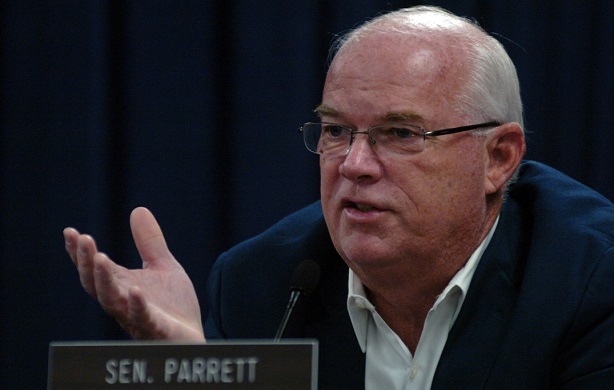FRANKFORT, KY— Voices of state officials reading story books to children in the State Capitol rotunda echoed through the building’s halls Friday as the state’s legislative Tobacco Settlement Agreement Fund Oversight Committee met in the Annex next door.

Senate Minority Whip Dennis Parrett, D-Elizabethtown, commenting on early childhood programs in Kentucky during Friday’s Tobacco Settlement Agreement Fund Oversight Committee
Governor’s Office of Early Childhood (GOEC) Executive Director Linda Hampton told the panel that turning the rotunda into a classroom for a day to support the state’s “Believe in Me KY” literacy and adoption/foster care initiative showcases some of the good things that Kentucky’s tobacco settlement dollars make possible.
“All of this could not have happened (except) through the importance of the tobacco money because again, the fact truly is literacy is the foundation for learning,” said Hampton.
Kentucky lawmakers budgeted over $24.5 million in its tobacco settlement funds for its Early Childhood programs in fiscal year 2018, Hampton reported. Most of those funds are allocated to two programs, child care assistance and the HANDS (or Health Access Nurturing Development Services) Program. HANDS received slightly more than the child care program – or $9 million—in fiscal year 2018, according to GOEC.
HANDS is overseen by the Department for Public Health, which also administers the state’s Early Childhood Mental Health (ECMH) program that serves mostly children from birth through age 5 and their families. The department’s Early Childhood Development Branch manager Paula Goff told the panel that adverse experiences in children too young to read can lead to trouble later on.
“Children who don’t have good social and emotional development – they don’t form good attachments with caring adults – as they get older, we read about them in the newspaper. We see what happens to them splattered across our TVs, and right now many of those children if you look back … they’re in prison,” said Goff. Breaking that cycle means offering supports for them and their families, she said.
Her branch helps toward that end by using state tobacco dollars to provide support to families by funding services from mental health specialists in their “off hours,” Goff said. In fiscal year 2018, the ECMH served over 4,700 children and families and helped train over 1,000 staff in Head Start, childcare and state-funded preschool.
The HANDS program provides hands-on training to parents of young children through a voluntary home visiting program handled by local health departments. Over 5,500 first-time parents were served by that program with the support of state tobacco funds in fiscal year 2018, said Goff.
What Goff called the “proven effectiveness” of the HANDS program – which has been in place statewide since the year 2000 – has led the state to expand the program’s reach to families with more than one child. That part of the program is funded through a 2011 federal grant and non-tobacco dollars, she said.
Tobacco Settlement Agreement Fund Oversight Committee Co-Chair Myron Dossett, R-Pembroke, asked Goff how parents can receive support from HANDS. She said parents are referred for support from a number of sources including physicians and hospitals.
“It’s an open referral,” she said. “Once the health department gets the referral, they’ll call that family.”
A baby must be no older than three months to be eligible for services through the HANDS program under current state regulation, Goff said. But some mothers of older infants (up to six months of age) have a brand-new program to help them out. That program, called HEART (Healing Empowering Actively Recovering Together), is geared toward mothers in recovery from substance abuse, she said.
“Because not everybody gets captured in that first three months of life who would like to participate,” said Goff. The HEART program is now operating in Floyd County, but Goff there are plans to expand it to other areas.
Sen. Minority Whip Dennis Parrett, D-Elizabethtown, said an abandoned baby shared the same hospital nursery as his daughter some 30 years ago. He asked GOEC and Goff what services are available for abandoned infants. Most of those children, Goff said, end up in foster care.
There are more than 10,000 children in Kentucky’s foster care system right now, said Hampton.
“There are so many children who are abandoned, and they don’t have anything,” she said. “What they do have is folks like you who saw that. They have folks like all of us who are morally obligated to be there for our children.”
Kentucky’s tobacco settlement dollars are drawn from the state’s share of a 1998 multi-billion-dollar settlement between major tobacco companies and 46 states.
--END--









